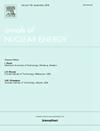基于支持向量回归的换热器稳态工况数据驱动预测
IF 2.3
3区 工程技术
Q1 NUCLEAR SCIENCE & TECHNOLOGY
引用次数: 0
摘要
换热器稳态运行条件的确定是一项基本而复杂的计算任务。传统方法通常依赖于复杂的理论模型和大量的经验数据,这使得它们劳动密集,效率较低。相反,机器学习和数据驱动的方法在简单、易用和快速响应能力方面表现出优势。本研究探索了应用灰色关联分析(GRA)增强的支持向量回归(SVR)来预测预热器和蒸汽发生器的稳态状态。结果表明,支持向量回归法对系统稳态运行的预测是非常有效的。虽然预测性能在预热器和蒸汽发生器之间有所不同,但所提出的模型始终具有较高的准确性,平均误差低于3.5%。此外,该模型显示出很强的鲁棒性,在输入波动的情况下保持可靠性,从而突出了其在现实世界环境中实际部署的潜力。本文章由计算机程序翻译,如有差异,请以英文原文为准。
Data-driven prediction of heat exchanger steady-state conditions based on support vector regression
Determining the steady-state operating conditions of heat exchangers is both a fundamental and complex computational task. Traditional methods typically depend on intricate theoretical models and extensive empirical data, making them labor-intensive and less efficient. Conversely, machine learning and data-driven methods exhibit advantages in simplicity, ease of use, and rapid response capabilities. This research explores the application of Support Vector Regression (SVR) enhanced by Grey Relational Analysis (GRA) to predict steady-state conditions of preheaters and steam generators. The results reveal that SVR is remarkably effective in forecasting the steady-state operations. Although predictive performance varies between the preheater and steam generator, the proposed model consistently achieves high accuracy, with mean errors below 3.5 %. Furthermore, the model exhibits strong robustness, maintaining reliability despite input fluctuations, thereby highlighting its potential for practical deployment in real-world settings.
求助全文
通过发布文献求助,成功后即可免费获取论文全文。
去求助
来源期刊

Annals of Nuclear Energy
工程技术-核科学技术
CiteScore
4.30
自引率
21.10%
发文量
632
审稿时长
7.3 months
期刊介绍:
Annals of Nuclear Energy provides an international medium for the communication of original research, ideas and developments in all areas of the field of nuclear energy science and technology. Its scope embraces nuclear fuel reserves, fuel cycles and cost, materials, processing, system and component technology (fission only), design and optimization, direct conversion of nuclear energy sources, environmental control, reactor physics, heat transfer and fluid dynamics, structural analysis, fuel management, future developments, nuclear fuel and safety, nuclear aerosol, neutron physics, computer technology (both software and hardware), risk assessment, radioactive waste disposal and reactor thermal hydraulics. Papers submitted to Annals need to demonstrate a clear link to nuclear power generation/nuclear engineering. Papers which deal with pure nuclear physics, pure health physics, imaging, or attenuation and shielding properties of concretes and various geological materials are not within the scope of the journal. Also, papers that deal with policy or economics are not within the scope of the journal.
 求助内容:
求助内容: 应助结果提醒方式:
应助结果提醒方式:


